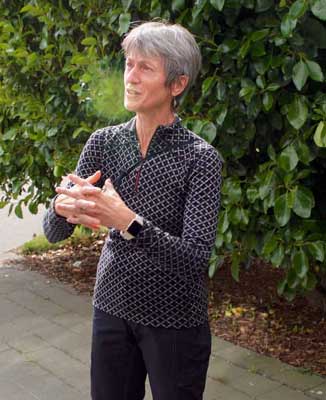Remarks from Dr. Kelly Falkner, Director, NSF Office of Polar Programs
(read for her by Dr. Chuck Amsler, Station Science Leader)
 *
*
|
On behalf of everyone in the U.S. Antarctic Program, I wish everyone at Palmer Station a very happy 50th birthday. I wish I could be there with you to celebrate. But Palmer is a small and close-knit community of people, carrying out or supporting research that is world-class in caliber and global in its importance, so it's fitting that you have planned and are holding your own commemoration, with an eye to that uniqueness. The origins of Palmer Station are solidly within the realm of marine biology. How could it be otherwise, with the ocean realm literally at your front door? But over the years since it was first built, it has become clear that Palmer is situated at a strategic spot for studying change over time in one of the fastest warming parts of our planet. Change that has the potential to affect each and every one of us worldwide. So, it is both fortunate and natural that Palmer is also home to one of only 28 unique Long Term Ecological Research sites around the globe. Since 1990, researchers with the LTER, as well as other scientists based at Palmer, have observed increasing air temperatures, changes in wind patterns and sea-ice cover; and declines in many food web components such as penguins and krill. Truly, you have a finger on the pulse of the planet. Though Palmer may be the smallest--those in the know would say "the most intimate" -- of the three U.S. Antarctic Program Stations, the implications of the research NSF supports there is disproportionate to the size of the community. Carl Sagan once wrote: science is a candle in the dark. Thank you for working, day and night, so very hard, to keep that candle burning. Congratulations to you all on the 50th anniversary of world-class research at Palmer. And here's to 50 more. *Photo of Kelly Falkner in Christchurch, 9 November 2016, cropped from this official U.S. State Department photo of Dr. Falkner with Secretary of State John Kerry and NSF representative Art Brown. |